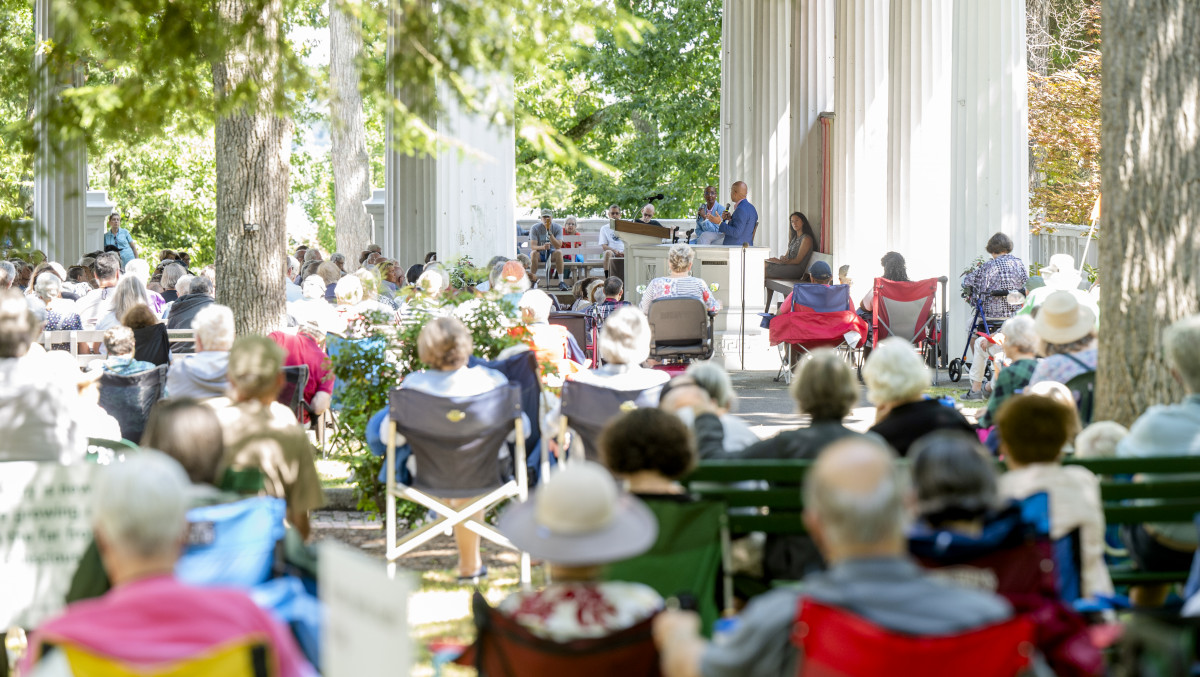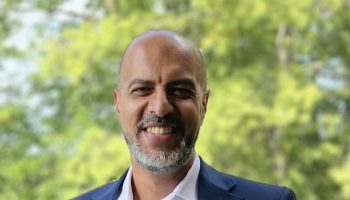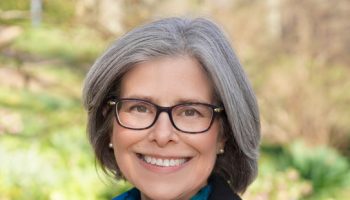Telling the truth can be a courageous act in a country built on lies. Discussing the impacts of white privilege and anti-Black narratives on the structural and systematic functioning of American society requires bravery.
The V. Rev. Kelly Brown Douglas engaged in conversation with Darren Walker, president of the Ford Foundation, on Wednesday in the Hall of Philosophy. Their lecture, “New Profiles in Courage,” shares its name with the Week Eight Chautauqua Lecture Series and Interfaith Lecture Series theme.
Douglas, ordained minister, canon theologian at Washington National Cathedral and dean of Episcopal Divinity School at Union Theological Seminary, is serving Chautauqua as this week’s chaplain-in-residence. Her dialogue with Walker was rooted in familiarity.
“This is going to be a conversation among two people who know each other and can have a real talk,” Walker said.
As a Black gay Christian, Walker has experienced homophobia in the Black church. He asked Douglas why it is so hard for some Black people of faith to accept everyone who wants to engage in faith and fellowship.
Douglas said Black people have long faced oppression, subjugation and assault for simply existing, and it struck her as odd that they would do the same to another group of people. She wanted to understand why, as one of her son’s godfathers was gay. She professed that even though he loved the church, the church refused to love him back.
“What I discovered, amongst other things, is that when we talk about sort of the tropes and the stereotypes that have shaped Black reality, we know that one of those stereotypes has been the way in which Black people have been sexualized,” Douglas said.
On the hypersexualization of Black people, Douglas pointed to white supremacist ideologies that have impacted the treatment of LGBTQ people in the Black church.
“(White supremacy) might not have all to do with it, but it has something to do with it,” Douglas said. “It’s compounded this problem.”
In the merge between white supremacy, anti-Black ideologies and hypersexualization alongside Christian faith traditions, homophobia is born. Douglas believes these ideologies have impacted the rights of Black personhood.
“Now, that’s no excuse,” Douglas said. “… For our own well-being, for our own humanity, … we have got to begin to unravel this. … When we understand it, that becomes one of the ways in which we begin to deconstruct it and refuse to allow it to stand.”
Walker began to discuss systemic racism in the criminal justice system. Research has found that now, one out of every three Black boys born can expect to go to prison in his lifetime, and about 40% of the inmate population in the criminal justice system is made up of Black people. He asked Douglas how people of faith can engage in this large, systemic issue.
“Black children are disproportionately trapped in abject poverty. That’s a pipeline to the system of incarceration. The real miracle is when they don’t end up in jail. The real miracle is when they don’t end up dead,” Douglas said. “Our faith communities have to take the lead, calling it out, speaking the truth. … (They must be) accountable, not to the way things are, but to the way they are supposed to be.”
Describing his grandparents’ experiences in the Black church, Walker said Sundays were a day of liberation, as Black people were able to experience dignity and acknowledgment. But now nearly all religions are experiencing a decrease of young populations becoming involved in their faith traditions.
Douglas believes this is a failure of the church. Her son, Desmond, has said that churches need to make all people feel welcome and allow space for people to be themselves without judgment.
Walker asked how churches can work to regain trust; Douglas said the church needs to be brought to the younger demographics that are experiencing that distrust.
“One of the roles you play with Black folks (and) white folks is to be a truth-teller,” Walker said. “Bringing us back to this idea of new profiles in courage, it is hard to have the courage to be a truth-teller in an institution that may not really want to internalize it.”
Douglas said it is easier for people to listen to the changes that need to be made rather than acting on those changes, which makes people complicit. People may want reform and equality, but they often find it difficult to sacrifice their own privilege.
“This ‘Make America Great Again’ environment has exacerbated this whole reality of white supremacists, anti-Black racism, because what we’re finding is downward mobility of whiteness,” Douglas said.
People of color and immigrants have been blamed for white downward mobility, but this distracts from the root of the problem.
“Blacks and immigrants have been blamed for that,” Douglas said. “… When you blame those already on the bottom … it protects you from looking at the systems and structures that have created this unjust privilege in the first place.”
This phenomenon, according to Douglas, seems to have increased hatred against Black bodies through physical, systematic and structural means.
As a country, Walker asked Douglas, how can America stop this toxic cycle of hatred?
“We’ve got to first have the courage, the moral courage, to tell the truth about our history, about who we are as a nation,” Douglas said. “We didn’t just arrive at white supremacy overnight. It’s embedded in the very foundation of this country. Anti-Blackness is embedded in the very foundation of this country.”
Giving a voice to those who have been voiceless in the discussion of history would bring forward new perspectives. The removal of true history in some schools concerns Douglas.
Building relationships with people who are different from oneself is another way to remedy these issues of hatred, by creating a sense of understanding and connection, she said.
“Until we begin to become more proximate to people who are different from ourselves,” Douglas said, “(we won’t be able to) see people as the people that they are and not as the stereotypes.”
Douglas presented findings from the Public Religion Research Institute, that 75% of white people do not have a person of color in their intimate social circles. Out of the 25% that do, their social circles were still over 90% white.
Douglas believes that white people must address their uninterrupted, uninterrogated whiteness by telling the truth, but Walker feels it is a complicated process.
“We’ve crafted narratives about who we are as a people,” Walker said. “Those narratives have sustained and inspired us. … And those narratives have helped Americans, white Americans, feel good about themselves and feel aspirational for those ideals. … And so to simply say it’s all a lie … is very hard.”
While some white people play by the rules and feel as though their successes were achieved fairly, Walker explained that the system is rigged for them to be winners, which is a tough pill to swallow. Many white people could find this deeply offensive, as they feel as though they worked hard for their earnings.
Because of their privilege, white people often do not have to feel uncomfortable.
White people, according to Douglas, need to start to wake up other white people in their communities, to see and speak the truth of privilege. They must be intentionally committed to creating a fair and equal society.
“There has to be an intentional recognition and interrogation of whiteness and intentional realization of privilege,” Douglas said. “… Every day, you have to make a decision that (you are) not going to live passively into whiteness, but going to live over and against it.”





